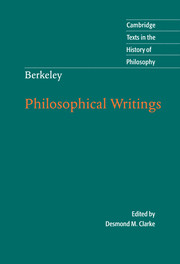Book contents
- Frontmatter
- Contents
- Acknowledgments
- List of abbreviations
- Introduction
- Chronology
- Further reading
- Note on the texts
- An Essay towards a New Theory of Vision
- A Treatise Concerning the Principles of Human Knowledge
- Three Dialogues between Hylas and Philonous
- An Essay on Motion
- Alciphron: or, the Minute Philosopher [excerpts]
- Siris: A Chain of Philosophical Reflexions and Inquiries Concerning the Virtues of Tar-Water [excerpts]
- Glossary
- Index
- Cambridge Texts in the History of Philosophy
Alciphron: or, the Minute Philosopher [excerpts]
Published online by Cambridge University Press: 05 June 2012
- Frontmatter
- Contents
- Acknowledgments
- List of abbreviations
- Introduction
- Chronology
- Further reading
- Note on the texts
- An Essay towards a New Theory of Vision
- A Treatise Concerning the Principles of Human Knowledge
- Three Dialogues between Hylas and Philonous
- An Essay on Motion
- Alciphron: or, the Minute Philosopher [excerpts]
- Siris: A Chain of Philosophical Reflexions and Inquiries Concerning the Virtues of Tar-Water [excerpts]
- Glossary
- Index
- Cambridge Texts in the History of Philosophy
Summary
In Seven Dialogues, Containing an Apology for the Christian Religion, against those who are called free-thinkers.
3rd edition 1752
[Excerpts from Dialogues IV and VII]
The Fourth Dialogue
1 Early the next morning, as I looked out of my window, I saw Alciphron walking in the garden with all the signs of a man in deep thought. Upon which I went down to him.
Alciphron, said I, this early and profound meditation puts me in no small fright. How so? Because I should be sorry to be convinced there was no God. The thought of anarchy in nature is to me more shocking than in civil life, inasmuch as natural concerns are more important than civil and the basis of all others.
I grant, replied Alciphron, that some inconvenience may possibly follow from disproving a God; but as to what you say of fright and shocking, all that is nothing but prejudice, mere prejudice. Men frame an idea or chimera in their own minds, and then fall down and worship it. Notions govern mankind; but of all notions, that of God's governing the world has taken the deepest root and spread the farthest. It is therefore in philosophy an heroical achievement to dispossess this imaginary monarch of his government, and banish all those fears and spectres which the light of reason alone can dispel:
Non radii solis, non lucida tela diei
Discutiunt, sed naturae species ratioque.
- Type
- Chapter
- Information
- Berkeley: Philosophical Writings , pp. 269 - 314Publisher: Cambridge University PressPrint publication year: 2009
Accessibility information
- 1
- Cited by

